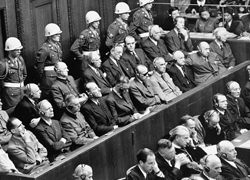One of the biggest criticisms of the WWII Nuremberg Tribunal was that it was victors justice: the statute only authorized prosecution of crimes committed by the Axis. In addition, both the prosecutors and judges were comprised of nationals from the victorious powers: American, British, French and Soviet.
In subsequent tribunals, international justice has sought to avoid the appearance of victor’s justice with different approaches. Some tribunals have sought to seeking a geographic balance in the prosecution team and on the judicial panels. Other tribunals have excluded participation by judges from the states involved in the conflict. Some tribunals have a policy to prosecute perpetrators of mass crimes from all of the major belligerent forces.

One fallout from the latter policy of prosecuting all parties to a conflict is the public perception that the crimes associated with the parties are of equivalent gravity. Most legal scholars would agree that the allies committed war crimes against Germany and Japan by using weapons and tactics that either targeted civilian areas or had a disproportionate effect on them. These crimes were never prosecuted, but even so, few scholars would contend that the Allied powers’ crimes during WWII were the equivalent of those of the Nazis. The unqualified decision to commit genocide is not the same as a war crime motivated by an expeditious end of the conflict.
The same can be said of Rwanda. The Rwanda Tribunal has only been able to prosecute the main perpetrators, the Hutu extremists who planned and executed the genocide. But many feel that there is substantial evidence of crimes committed by the Tutsi rebel army as it invaded Rwanda that have not been prosecuted. The problem as I see it is that proponents of Tutsi prosecutions frequently argue equivalency of the two crimes. The Tutsi army, the RPF, may well have committed substantial atrocities, and I am a strong advocate of holding perpetrators criminal responsible. International law mandates it in fact. But justice also requires that criminality be fairly apportioned between belligerents. The decision to exterminate a ethnic group is on a different scale than reprisal crimes that occur in the angry aftermath of those crimes.
Tribunals have prosecuted both sides of the conflict in Yugoslavia and Sierra Leone as well. Balanced prosecutions help deliver justice to conflict region by avoiding the appearance of bias. However, it is important to not equate prosecutorial balance with moral equivalency.


